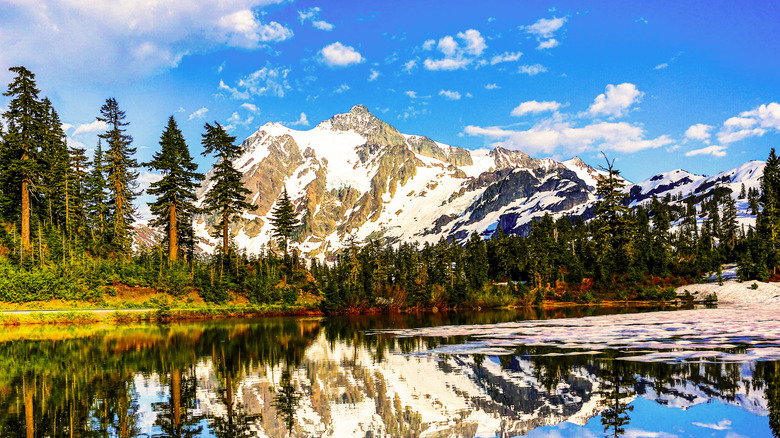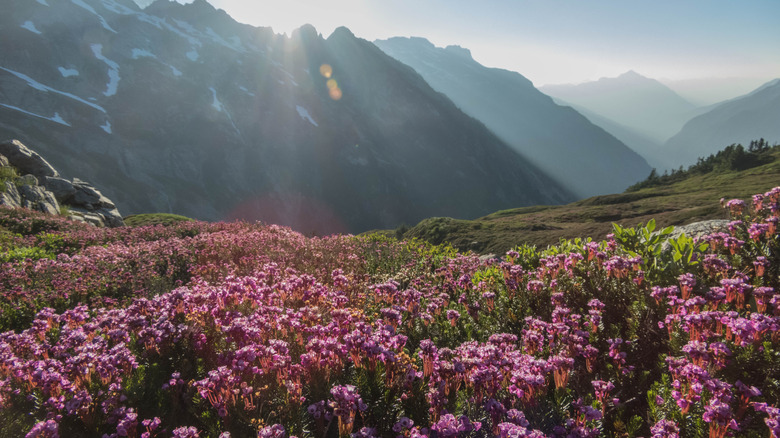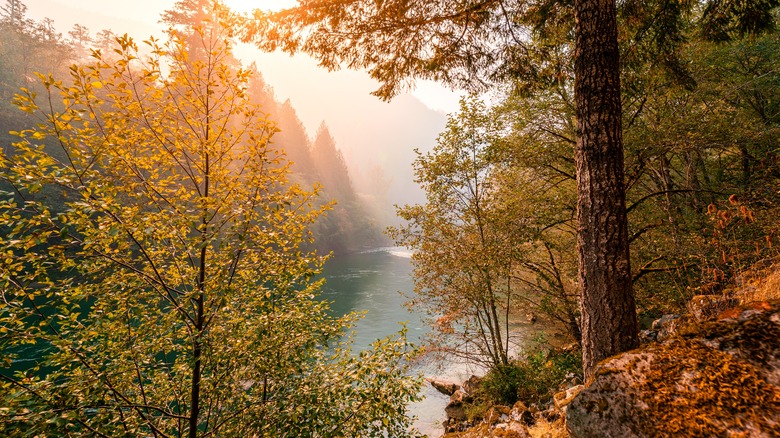This Thrilling National Park Hike In Washington Will Make You Think You're In Switzerland
You haven't seen a sunset until you've watched the rays drench the snow-capped peaks of North Cascades National Park in a hazy amber gold. Nestled in the northernmost mountains of Washington, this photogenic reserve stretches to the Canadian border. Just three hours from Seattle, it's a manageable day trip from the city but feels a world away. The reserve is home to acres of stunning trails, indigenous flora and fauna, and one of the five tallest waterfalls in the United States.
If you're looking for a sanctuary of peace to escape the busy urban atmosphere, the Cascade Pass Trail is for you. This winding network will leave you unable to distinguish between the North Cascades and the culminating peaks of the Swiss Alps. This 7-mile hiking trail ascends and dives into a hidden realm of captivating terrain with panoramic views that rival even Switzerland's landscapes, with glacial lakes, cascading waterfalls, and evergreen meadows. In fact, these cliffs are often called the North American Alps because of the comparable glory that matches Switzerland's stunning mountains peak for peak. Washington is home to three of the country's beautiful national parks, yet none are able to compete with the Swiss Alps quite like North Cascades National Park, and hiking the Cascade Pass Trail is the best way to experience it.
Summit the Cascade Pass Trail
The Cascade Pass Trail is one of the most coveted and thrilling endeavors in the Cascades. It's moderately difficult with sustained, steep inclines, and it takes about four hours to complete the full 7.4-mile out-and-back trail. This Pacific Northwest trek is also a popular gateway to the summit of the Cascade's popular climbing routes, including Boston, Sahale, Mixup, and Magic Peaks. Keep your eyes peeled to spot the local wildlife, as mountain goats, mule deer, and black bears are all frequent sightings along this trail.
From the trailhead, you'll follow a series of switchbacks as the trail climbs the side of the cliff. You can take in the stunning landscapes, with fields of wildflowers and mesmerizing views of the sea-green mountains all around. The views from the summit are incredible and you can enjoy a well-deserved break before heading back down.
Ambitious hikers can complete an additional 6-mile journey that leads to the Sahale Glacier Camp, which is more strenuous than the first half of the Cascade Pass Trail but allows you to sleep under the stars if you're ready to hike with a tent. Journeys along this trail often parallel fields of seasonal blueberries or glacier lilies. The route from Cascade Pass to the Sahale Arm sets out on yet another steep incline, but the enchanting views of Sahale Mountain and Doubtful Lake are well worth the additional effort for experienced hikers. Make sure you apply for a backcountry permit to camp overnight.
How to prepare for the North Cascades
The solstice and solitude that so many wayfarers search for among the Alps can just as easily be found in the stillness of North Cascades National Park. It's not just the serene vistas showcasing Washington's mountains that will make you feel like you're in the Swiss Alps. With over 300 glaciers, North Cascades National Park has more glaciers than any other national park in the United States — perhaps yet another reason why these mountains are so frequently compared to their European counterparts in Switzerland.
The alpine town of Sedro Woolley marks the entry point of North Cascades National Park where it intersects with North Cascades Highway. Cascade River Road leads directly to the main parking area, but visitors should note that the last 3 miles of this road are often closed during the winter season. Given the altitude, freezing temperatures, and heavy snowfall during the colder months, July through October are the best months to hike this captivating mountain pass. The highest peaks are often still blanketed in snow into July. A trip during the shoulder seasons of spring and fall promises vibrant pops of color from seasonal foliage and even fewer visitors than in summer. However, hikers should be prepared for storms, rain, and wind, as well as snowfall that could lead to trail closures, so be sure to plan your hike along the Cascade Pass Trail in advance.


